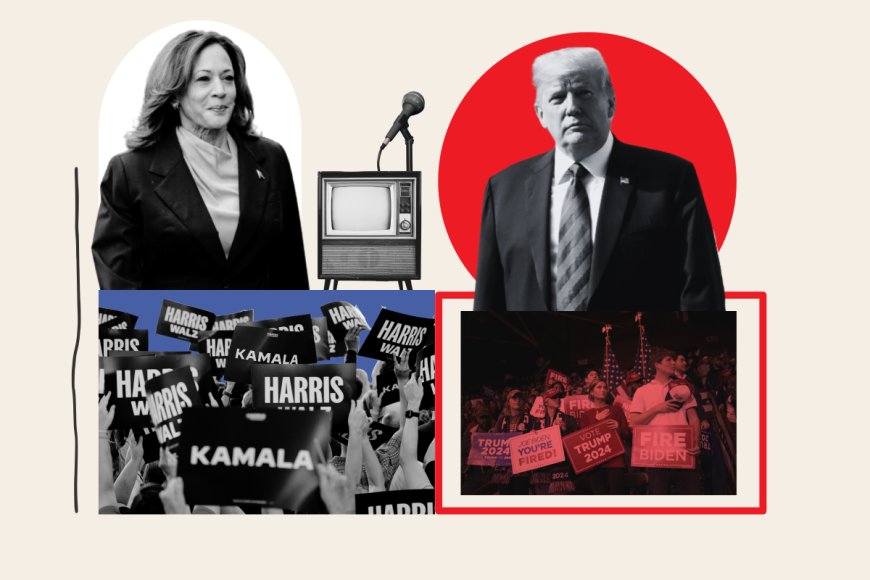Harris and Trump Present Stark Contrasts in Presidential Race
As the 2024 presidential race heats up, Vice President Kamala Harris and former President Donald Trump present sharply divergent visions for America's future, with significant differences on taxes, abortion, immigration, global alliances, climate change, and democratic values.

As the 2024 presidential race heats up, Vice President Kamala Harris and former President Donald Trump present sharply divergent visions for America's future, with significant differences on taxes, abortion, immigration, global alliances, climate change, and democratic values.
Since taking over as the Democratic nominee, Harris has pledged to advance a progressive agenda while maintaining some of the policies of President Joe Biden. Her platform includes tax cuts for the middle class, increased taxes on the wealthy and corporations, and strong government action on climate change. Harris also aims to restore abortion rights and has advocated for a comprehensive approach to address climate issues, building on the Biden administration's Inflation Reduction Act.
In contrast, Trump, seeking a return to the White House, focuses on expanding his 2017 tax cuts, increasing tariffs, and promoting fossil fuels. His vision includes a centralization of power in the executive branch and a rollback of many Biden-era policies. Trump’s agenda also includes a renewed emphasis on deregulation and a hardline stance on immigration.
Key Policy Differences
Abortion
Harris: The Vice President advocates for federal legislation to guarantee abortion access, reversing the Supreme Court's decision overturning Roe v. Wade. She has criticized state-level abortion bans and promised to block any potential nationwide ban from a future GOP-led Congress.
Trump: Trump, who appointed the justices that overturned Roe v. Wade, supports leaving abortion decisions to individual states. He has stated he would not sign a national abortion ban and supports allowing states to determine abortion-related prosecutions and access.
Climate Change and Energy
Harris: Harris has supported the Green New Deal and has focused on implementing climate provisions from the Inflation Reduction Act. This includes promoting electric vehicles and clean energy projects, though she acknowledges the U.S. may struggle to meet ambitious emission reduction targets.
Trump: Trump emphasizes expanding oil drilling, increasing tax breaks for fossil fuel industries, and rolling back Biden’s climate policies. He has criticized wind power and aims to re-exit the Paris Climate Accords, eliminate subsidies for wind energy, and dismantle various environmental regulations.
Democracy and Rule of Law
Harris: Harris has positioned herself as a defender of democratic values, contrasting her background as a prosecutor with Trump’s legal troubles. She has emphasized the importance of a fair judicial system and criticized Trump’s challenges to the 2020 election results and his role in the January 6 Capitol attack.
Trump: Trump has repeatedly questioned the legitimacy of the 2020 election and threatened to overhaul the Justice Department and FBI if re-elected. He has promised to pardon January 6 defendants and has suggested more aggressive responses to protests and crime.
Federal Government
Harris: She opposes the conservative “Project 2025” plan and supports protecting federal workers from political firings. Harris aims to prevent mass dismissals of civil servants and has defended the current administration’s approach to federal staffing.
Trump: Trump seeks to “obliterate the deep state,” reissue the Schedule F order to ease the firing of federal workers, and eliminate the Education Department. He also plans to cut government regulations and streamline federal operations.
Immigration
Harris: As the point person on immigration, Harris advocates for comprehensive reform, including pathways to citizenship for undocumented immigrants and enhanced border security measures. She criticizes Trump’s border policies and seeks to revive bipartisan immigration proposals.
Trump: Trump proposes a large-scale deportation effort, reinstating policies like Remain in Mexico and Title 42. He aims to ban travel from certain countries and end birthright citizenship for children of undocumented immigrants.
Israel and Gaza
Harris: Harris supports Israel’s right to self-defense and a two-state solution to the Israel-Palestine conflict. She has called for protecting civilians during the Gaza conflict and supports a proposed ceasefire deal.
Trump: Trump backs Israel’s military actions against Hamas but has criticized some of Israel’s tactics. He proposes stronger responses to pro-Palestinian protests and stricter immigration policies targeting supporters of Hamas.
LGBTQ+ Issues
Harris: Harris has defended LGBTQ+ rights and criticized Trump’s policies. Her campaign supports protections against discrimination and champions the Biden administration’s reversal of Trump-era restrictions on transgender individuals.
Trump: Trump has pledged to restrict transgender participation in sports, ban hormone treatments for minors, and limit gender identity discussions in schools. He aims to enforce traditional gender norms and reduce federal support for LGBTQ+ rights.
NATO and Ukraine
Harris: Harris supports continued aid to Ukraine and rebuilding alliances such as NATO, emphasizing the importance of international cooperation against Russian aggression.
Trump: Trump has criticized U.S. aid to Ukraine and proposed reevaluating NATO’s role. He claims he can end the conflict through negotiations and has threatened to encourage Russian actions against NATO members failing to meet defense spending targets.
Tariffs and Trade
Harris: The Biden administration under Harris has maintained and expanded tariffs on China, while focusing on strengthening trade with allies. It has also targeted specific industries and products for tariffs.
Trump: Trump plans to increase tariffs on a broad range of imports, including a proposed 100% tariff on Chinese goods. His trade policy emphasizes reducing Chinese influence and protecting U.S. industries.
As the election approaches, these contrasting visions will likely shape the debate and influence voters' choices on critical issues facing the nation.













































